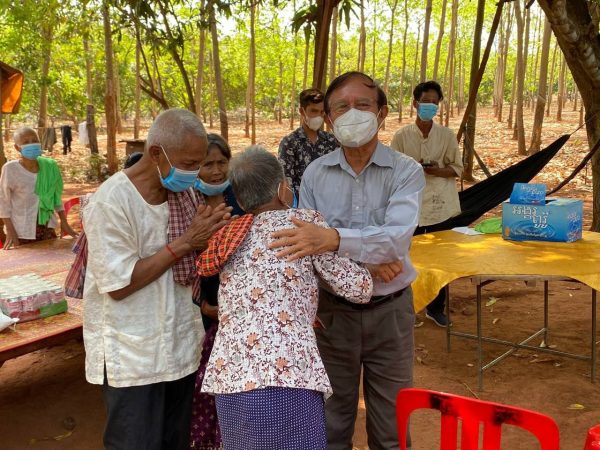The Battle Between Democracy and Autocracy, From Russia to Cambodia
In his March 1 State of the Union address, U.S. President Joe Biden pointed to the intensifying “battle between democracy and autocracy.” By calling for a “coalition of freedom-loving nations” to counter aggressive autocracies, President Biden was primarily referring to Russia’s invasion of Ukraine.
There are different fronts in the confrontation between autocracy and democracy. The objective of Russian President Vladimir Putin is apparently to conquer and occupy the whole of Ukraine, to install a puppet regime in Kyiv, and to present a Russian-controlled Ukraine as a “fait accompli” that nobody can safely challenge. With the passing of time, he imagines that this will acquire a veneer of legitimacy.
Putin’s attempt to take control of Ukraine is preceded by the forcible and illegal annexation of Crimea to the detriment of Ukraine in 2014. This can now be seen as a “fait accompli.”
Such actions are the stock in trade of Communist autocrats in other countries such as China, which annexed Tibet in 1951. Beijing also brutally took control of Hong Kong in 2020, violating the principle of “one state, two systems” previously agreed. A fait accompli can also be related to a country’s internal affairs when autocrats brutally seize or consolidate power in a purportedly irreversible manner. These can be military coups, such as that staged by Min Aung Hlaing in Myanmar in 2021, or institutional coups like that carried out by Prime Minister Hun Sen in Cambodia in 2017 with the arbitrary dissolution of the only parliamentary opposition party.
Diplomat Brief Weekly Newsletter N Get briefed on the story of the week, and developing stories to watch across the Asia-Pacific. Get the Newsletter
Hun Sen’s Coup in Cambodia
Enjoying this article? Click here to subscribe for full access. Just $5 a month.
Because I was personally concerned, I would like to elaborate on the institutional coup in Cambodia in 2017. This coup sought to eliminate the opposition and derail the democratic process. I also want to propose a solution to reverse that which supposedly cannot be undone.
Hun Sen accuses opposition leader Kem Sokha of having sought to overthrow his government with the support and complicity of the U.S. government. On the basis of this false accusation, Hun Sen had the opposition Cambodia National Rescue Party (CNRP) dissolved. The party was the only serious challenger to his regime, as shown by the results of national and local elections in 2013 and 2017.
But Kem Sokha’s trial has been dragging on for years. Prosecutors have been unable to produce any serious evidence to support the charge, which in any independent judiciary would long since have led to the accusation being dropped. Of the three scenarios which are theoretically possible, none is acceptable to one or other of the parties as it would threaten their political survival.
1st scenario: Hun Sen sticks with his accusation to the end and has Kem Sokha convicted for “treason” and the US for “criminal interference.” This scenario is practically impossible to carry out due to lack of proof. To jointly condemn Kem Sokha and the U.S. in such a blatant way would be a dangerous path for Hun Sen. His regime would suffer severe criticism and would lose all legitimacy.
2nd scenario: Under pressure from Hun Sen, Kem Sokha agrees to “confess to his crime” and immediately receives a “royal pardon” arranged by Hun Sen. Kem Sokha regains his freedom but finds himself discredited. This is Hun Sen’s preferred scenario because it would allow him to save face while avoiding the rehabilitation of the CNRP, the popularity of which is his greatest fear. Kem Sokha until now has refused to go along with this scenario as it would be the equivalent of political suicide.
3rd scenario : Hun Sen abandons his accusations against Kem Sokha and the U.S. Kem Sokha is found innocent with the immediate political result that the CNRP is rehabilitated. The situation is normalized and the democratic process is resumed. This is the scenario which Hun Sen fears the most and which he is seeking to avoid by dragging out Kem Sokha’s trial.
All those who support democracy and all friends of Cambodia should try to help the third scenario to come about. Hun Sen himself should face up to the need to accept this scenario before his scheduled to visit to the U.S. for the upcoming ASEAN-U.S. special summit, if only to avoid continuing to make senseless accusations against the country which will be hosting him.
Democracy and Peace
From Russia to China to Myanmar to Cambodia, democracy and peace are intimately intertwined. The two conditions are mutually reinforcing, and stand or fall together. It is rare for a democratic country to invade a neighbor, or for two democratic countries to declare war against each other. Decisions in a democracy must carry public opinion with them, and public opinion will only support war in extreme necessity. An autocracy has no such constraint.
The current autocratic regime in Cambodia is a threat to regional peace and security because of Hun Sen’s alliance with an autocratic and aggressive China. He dangerously supports Beijing’s expansionist policy by reportedly allowing Chinese military facilities on Cambodian soil as denounced by the U.S. Knowing that he lacks popular support at a time when the West is imposing sanctions for his grave violations of human rights, Hun Sen needs Chinese political and financial support to stay in power. Such a situation recalls the Pol Pot regime of 1975-1979, which cost two million Cambodians their lives and which had Communist China as its only foreign supporter.
Enjoying this article? Click here to subscribe for full access. Just $5 a month.
Only a democratic regime can assure the independence and neutrality of Cambodia and contribute to regional peace and security. A return to democracy would allow Cambodia to rejoin the coalition of freedom-loving nations which President Joe Biden seeks.











